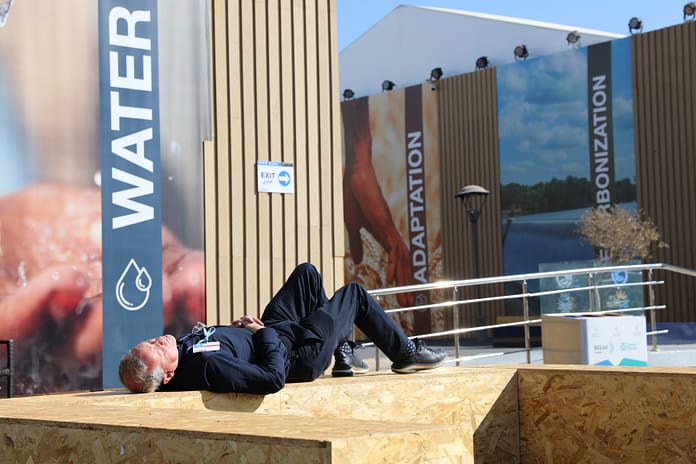A ministerial dialogue and a new global partnership at COP28 signal commitment to integrate water and food systems — for both adaptation and mitigation — in national climate plans.

At a high-level dialogue held during COP28 on December 10, 2023, ministers of agriculture, environment and water unanimously called for water-resilient food systems. Also at the table were leading international organizations, including the International Water Management Institute (IWMI), that are addressing the interlinked food, water and climate crises through science, research and development.
This was the first-ever ministerial dialogue on this topic at the Conference of Parties, part of the UNFCCC process. It gives high-level political recognition to the water-food nexus in the context of climate change. This convergence of perspectives represents a major shift from siloed approaches — and comes at a time when the world is demanding integrated climate action.
But how did we get there?
In the months leading up to COP28, a growing consensus had been brewing on the need for joint climate action on both food and water systems. It built on the global momentum from the UN Food Systems Summit and the UN 2023 Water Conference, as well as the COP28 Presidency’s commitment to achieve net-zero, nature-positive and resilient agrifood and water systems.
Another milestone was the Global Food Security Summit in November, hosted by the United Kingdom. During the ministerial dialogue at COP28, Andrew Mitchell, Minister of State for Development and Africa, announced the United Kingdom would commit £39.1 million for a new Just Transitions for Water Security program. “This program will build on the support we already provide to breakthrough initiatives that take a holistic approach to changing water governance. Take the AGWA Water Tracker, for example.” The Water Tracker project, in which IWMI is a partner, will support governments to enhance water resilience through national climate planning.
Ministers from Africa, Asia, Europe and Latin America shared examples of ways in which they are adapting food systems to be more water-resilient. They explained how reducing the water footprint of agriculture and food production is a key objective, both in their climate action commitments and their national planning.
The dialogue was co-chaired by the United Arab Emirates and Brazil and organized by the COP28 Presidency, with support from a technical advisory committee on which IWMI served. IWMI’s forthcoming 2024–2030 strategy aligns closely with critical priorities raised in the dialogue, offering innovations and strong, established partnerships that will support climate action at country level.
A clear path from Dubai 2023 to Belem 2025
Hours later, IWMI was also one of the partners launching the new Partnership for Water-Resilient Food Systems. It will support countries and non-state actors to better integrate water and food systems management — for both adaptation and mitigation — in their commitments and national adaptation plans, in the two years leading to COP30.
This partnership was endorsed by the ministers present, including co-chairs United Arab Emirates and Brazil, the presidencies of the current COP28 and COP30.
Hosted by the UNFCCC’s Climate-Resilient Food Systems (CRFS) Alliance, the partnership consists of a group of key international organizations working at the intersection of food and water systems worldwide: Australian Water Partnership (AWP), the COP28 Presidency, the Food and Agriculture Organization of the United Nations (FAO), the Global Resilience Partnership (GRP), the International Fund for Agricultural Development (IFAD), the International Water Management Institute (IWMI), the NDC Partnership, the World Bank, the World Economic Forum, and the World Farmers’ Organization (WFO).
The partnership will support compelling actions in the areas of innovative policy, finance, technology and research and development. Partners will leverage existing initiatives, projects and resources — but are also developing a new interactive toolkit showcasing best practices in food and water management in Nationally Determined Contributions (NDCs).
“By 2050 we need to feed 10 billion and we need to produce food to feed that population,” explained Maria Helena Semedo, Deputy Director-General of FAO, during the launch event. “Having water-resilient food systems is important, so we can feed the growing population and also have enough water for urbanization, industrialization, and other economic, social, and environmental needs that the world will have.”
The Director General of IWMI, Mark Smith, emphasized the need for the partnership “to have convergence at its core” and “be serious” about building resilience. “That means being able to integrate and join the dots: across scales and sectors; between governance and participation and local action; with data, skills and knowledge at all levels,” he said. “Also with technologies, infrastructure and nature-based solutions – but the partnership also needs to take care not to start with technologies, through this is often the temptation, because that is not how you solve complex problems.”
Keeping water flowing and food growing
Smith also highlighted the inextricable link between water, food and climate during his Head of Delegation statement to the COP28 Plenary on December 9, representing IWMI as an international organization observer.
“Everyone gathered here at COP wants to create […] a safe, just and sustainable world. And by building water-resilient food systems we can do precisely that: take care of our planet — while making sure people thrive. This is how we help economies withstand a future of intensifying water shocks — and also protect our precious water resources.”
Smith urged COP28 delegates to put water and food at the center of climate plans, strategies and finance.


